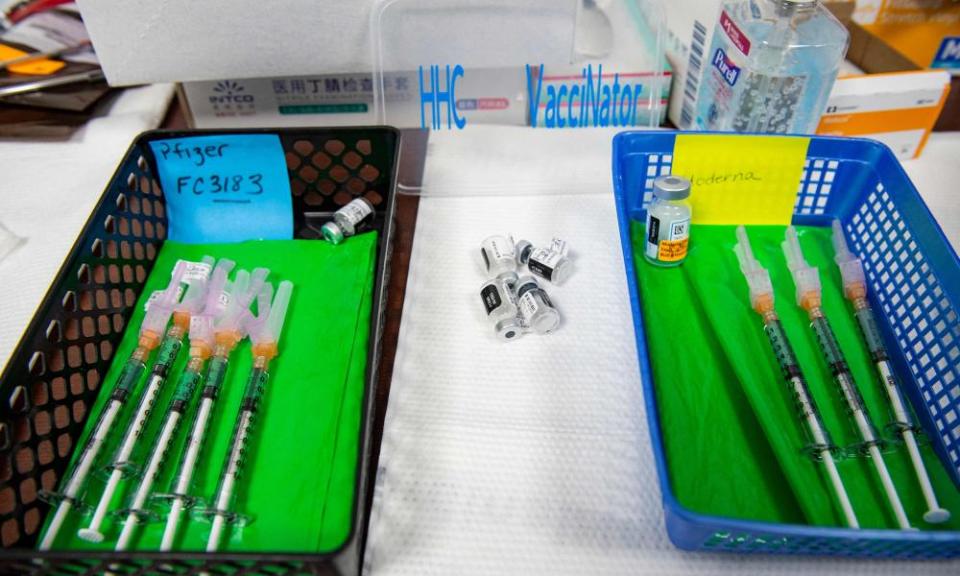Experts divided over Covid booster shots days ahead of US rollout

Mere days ahead of the Biden administration’s self-imposed deadline to begin Covid-19 booster shots, experts remain deeply divided over the benefits of a third jab, while health officials are scrambling to prepare for the rollout despite a void of critical details.
The vast majority of vaccinated adults in the United States want a booster, some so urgently that they are already fudging their vaccination records to get one.
So – despite controversy and confusion about whether the additional shots are even necessary amid a global shortage – the White House is under immense political pressure to follow through with starting boosters next week.
“Weeks ago, the administration decided that the public needs cake and deserves cake, and so shall have cake,” John P Moore, a virologist at Weill Cornell Medicine, told the New York Times. “Now, the public expects cake and would be very annoyed if its cake was taken away at this point.”
Last month, the US’s top health officials announced a plan to officially greenlight boosters starting the week of 20 September, pending endorsement by the US Food and Drug Administration (FDA) and the Centers for Disease Control and Prevention (CDC).
Back then, they said Americans would qualify for a third dose of either the Pfizer-BioNTech or Moderna vaccine eight months after their second – a timeline that could make millions eligible next week.
But Moderna didn’t provide adequate data on boosters, leaving only the Pfizer vaccine as a possibility in time for this month’s deadline. On Friday, an FDA advisory committee will consider Pfizer’s application concerning third doses for patients 16 and older.
An advisory committee for the CDC – which usually dictates vaccination policy – is teed up for a meeting next week.
Third doses of the Pfizer and Moderna vaccines are already available to those with compromised immune systems. But the plan for such an expansive booster rollout followed alarming reports of waning vaccine efficacy in Israel, where an urgent campaign to vaccinate quickly has made the country a data source for other parts of the world.
It also coincided with yet another major uptick in US infections, driven by the highly infectious Delta variant. Those cases are currently on a downward trend.
Joe Biden has described boosters as if they are a no-brainer and plans to get his own once they are widely available, according to Reuters.
“As a simple rule – rule: eight months after your second shot, get a booster shot,” Biden said. “It will make you safer and for longer. And it will help us end the pandemic faster.”
But some experts were upset by the administration’s perceived meddling in important health decisions, Politico reported.
Earlier this week, two of the FDA’s top vaccine regulators – who are reportedly departing the agency at least in part because of opposition to the booster policy – joined an international group of experts in challenging the general population’s current need for additional protection.
The vaccines remain highly effective against severe disease, they wrote in the Lancet, while boosters could pose risks if “widely introduced too soon, or too frequently”. “Current vaccine supplies could save more lives if used in previously unvaccinated populations than if used as boosters in vaccinated populations,” they wrote.
As experts debate, state and local health officials are trying to get ready to possibly administer boosters next week. But amid the chaos, they are being left in the dark.
“What is the interval for boosters? Is it any shorter than eight months at this point? What is the age cut-off? Will there be priority groupings?” Lori Tremmel Freeman, chief executive officer of the National Association of County and City Health Officials, told CNN.
“We don’t want to appear uncoordinated on boosters.”

 Yahoo Finance
Yahoo Finance 